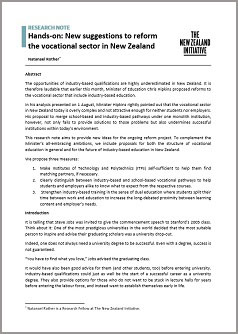The opportunities of industry-based qualifications are highly underestimated in New Zealand. It is therefore laudable that earlier this month, Minister of Education Chris Hipkins proposed reforms to the vocational sector that include industry-based education.
In his analysis presented on 1 August, Minister Hipkins rightly pointed out that the vocational sector in New Zealand today is overly complex and not attractive enough for neither students nor employers. His proposal to merge school-based and industry-based pathways under one monolith institution, however, not only fails to provide solutions to those problems but also undermines successful institutions within today’s environment.
This research note aims to provide new ideas for the ongoing reform project. To complement the Minister’s all-embracing ambitions, we include proposals for both the structure of vocational education in general and for the future of industry-based education in New Zealand.
We propose three measures:
- Make Institutes of Technology and Polytechnics (ITPs) self-sufficient to help them find matching partners, if necessary.
- Clearly distinguish between industry-based and school-based vocational pathways to help students and employers alike to know what to expect from the respective courses.
- Strengthen industry-based training in the sense of dual education where students split their time between work and education to increase the long-debated proximity between learning content and employer’s needs.
We hope Minister Hipkins will put further thought into the details of his planned reform. If not, the reform proposal may not just be a colossal waste of time and effort but also make it even more difficult for our youth to find what they love in life.






